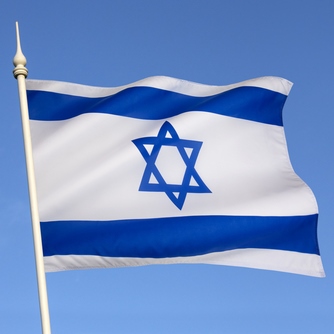click to dowload our latest edition
CLICK HERE TO SUBSCRIBE TO OUR NEWSLETTER


Published
5 years agoon
By
adminTALI FEINBERG
Towards the end of last year, the IDF provided special counter-terrorism training to commanders from the Ghana Armed Forces. Chad’s army is reportedly already using Israeli satellites to do surveillance on terrorist groups operating in the north of the country.
These are just some examples of Israel’s military assisting African armies to step up their counter-terrorism efforts, resulting in stronger ties between the Jewish state and the African continent.
It flies in the face of the “Africa for Palestine” theme of the upcoming Israel Apartheid Week (IAW), an international series of lectures and rallies held at universities. IAW organisers say Africa will “come alive” in support of the Israel-bashing extravaganza, but the evidence shows otherwise. It is clear that African countries are quietly forming close bonds with Israel on all fronts, especially in battling the ever-growing threat of terrorism on the continent.
“The fight against terrorism has become a global issue that requires well-trained security forces to fight the menace,” said Ghanaian Defence Minister Dominic Nitiwul following the training in Ghana. “This collaborative training between the Ghana Armed Forces and the Israeli Defense Forces is a step in the right direction, which adds to our efforts to ensure our preparedness and capacity building.”
In July 2018, the United States said that it would cut military aid for Africa’s fight against terrorism, and rather focus on “old threats” like China and Russia. Former Defence Secretary James Mattis announced a 10% cut in troop strength for the United States Africa Command.
This is in spite of the fact that African countries are struggling to prevent the expansion of terror groups in parts of the continent, according to a US State Department report. It leaves a void for Israel to fill.
“Many African countries seek closer ties with Israel in geopolitical fields such as security and counterterrorism,” wrote journalist Raluca Besliu in a recent YaleGlobal Online article. “Extremist movements such as Boko Haram in Nigeria and Al-Shabaab in Somalia are a threat in East and West Africa alike. Israel’s security knowledge is perceived as beneficial, especially in terms of technological surveillance, collecting and digitising personal data, and border-control systems.
“Israel has a direct interest in supporting African states in fighting terrorism and monitoring jihadist movements, and in preventing the destabilisation of Egypt, its southern neighbour,” she said.
In 2016, Israel’s Prime Minister Benjamin Netanyahu became the first Israeli prime minister in three decades to travel to Africa, visiting Uganda, Kenya, Rwanda, and Ethiopia. And in June 2017, he was the first non-African leader to participate in a Summit of the Economic Community of West African States (Ecowas) in the Liberian capital Monrovia.
The following November, he attended Kenyan President Uhuru Kenyatta’s swearing-in ceremony in Nairobi, joining leaders from other African countries and holding several bilateral meetings.
At the end of February this year, Israel hosted former soccer player and now Liberian President George Weah. He met Netanyahu and President Reuven Rivlin.
At the time of the Ecowas summit, Netanyahu said Israel was “returning to Africa in a big way”.
Netanyahu travelled to Chad in January this year to strengthen ties with the mostly Muslim country five decades after it ended relations with Israel. Chad’s President Idriss Déby visited Israel in November last year, renewing these ties.
“We have a shared struggle against the sickening evil of this century, which is terrorism,” Déby said at the time.
The leaders talked about the fight against terrorism, as well as increasing bilateral co-operation in agriculture, counterterrorism, border defence, technology, solar energy, water, and health. Chad’s army’s efforts to help combat Islamist terrorist group Boko Haram in neighbouring Nigeria, Niger, and Cameroon have made it an important ally of the West.
Netanyahu’s four visits to Africa over the past two years has been hailed by Atlantic Council Africa Centre expert J Peter Pham as a remarkable testament to how much of a priority the Israeli government has made of Africa. The Atlantic Council is a Washington DC non-partisan think tank and public policy group with a mission to promote constructive leadership and engagement in international affairs.
Israel recently appointed Colonel Aviezer Segal as its first military attaché to Africa in several decades. The foreign ministry, the IDF, the Mossad, and the Shin Bet security service are all working to boost military training in African countries.
“We treat African leaders with respect and appreciation and deal with them as equals, in a language of true camaraderie, personal friendship, and professionalism,” said Segal.
Israel has already categorically ruled out working with a number of African nations due to their human-rights record. A delegation of Israeli officials has been travelling to countries in Africa and carefully weighing requests for further military co-operation, according to Israel’s Channel 13.
Last year, fifteen countries with diplomatic ties to Israel hosted an Africa Day celebration at the Kfar Shmaryahu residence of the Nigerian Ambassador to Israel, Enoch Pear Duchi. There, Zambian Ambassador Martin Mwanambale said, “We recognise that there can be no meaningful development without peace on the continent. Hence, we aspire for a peaceful and secure Africa.
“We envisage that mechanisms for peaceful prevention and resolution of conflicts will be fully functional at all levels by 2020. We look forward to your [Israeli] government’s continued support for the African continent.”
